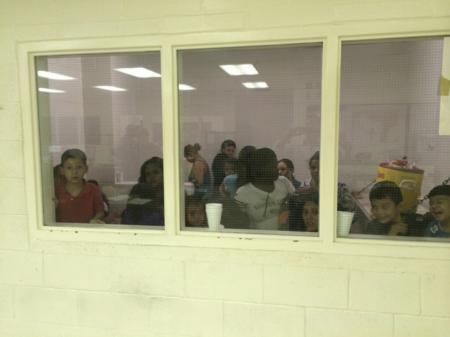A migrant crisis over abortion
Last year a crisis unfolded as thousands of children, some as young as 6, made their way alone from their Central American home countries and attempted a dangerous crossing into the United States. Many little ones died lonely deaths in the desert. Thousands were fortunately rescued by federal authorities and now fall under our government's care.
It's an open question whether -- or how many -- of these children should stay, but they are children. The federal government cannot simply house them in prisons. It must find ways to occupy them constructively -- to educate them, even -- while they await final disposition of their court cases.
Uncle Sam outsourced this work, as he often does, to the U.S. bishops' Migration and Refugee Services and other experienced refugee organizations, some of which are faith-based. That made sense.
But on Christmas Eve (presumably to avoid attention), the U.S. Department of Health and Human Services published an interim final rule that could disrupt this arrangement. It is designed to guarantee abortion access for minors in this precarious position, on the off chance that any of them might have become pregnant as a result of having been sexually abused.
Abortion does not heal abuse, and there is no law requiring it in these cases. This is merely a proposed regulatory change by HHS that would be finalized later this year, and perhaps another gratuitous shot at Christian agencies that have long been involved in this kind of humanitarian work.
The U.S. Conference of Catholic Bishops and other Christian aid groups have strongly objected in an official comment.
Their comment notes that the Catholic bishops have been assisting the federal Office of Refugee Resettlement for many years, yet "there have been no reported problems in terms of services to clients. The final rule therefore does not seem to remedy an actual problem or to address any actual past adverse impact on clients served."
The sad thing here is that the victims are the ones most likely to suffer as a result of this puzzling abortion power play. There is ample precedent for making a conscience exception regarding abortion and health care.
For example, health care providers and hospitals that see Medicaid patients are not required to perform or refer for abortions. Were it not for this arrangement, the Medicaid program would likely collapse in some places for lack of providers.
Sadly, the Christmas Eve rule eschews any such good-faith compromise. It proposes allowing Christian aid groups to refer minor children for abortions elsewhere -- something they cannot do in good conscience.
Alternatively, organizations (like the USCCB) with pro-life views can serve as auxiliaries for groups that are willing to pitch young migrant girls on having abortions.
"This," the coalition of Christian groups wrote, "will have the effect of disqualifying our organizations from being primary grantees, the very organizations that have the most experience in providing services to unaccompanied minors and are best qualified to serve as grantees. Such a discriminatory effect would immediately work to the detriment of the children who are the intended beneficiaries of the program."
And herein lies the real question. Does this program and the migrant children it aims to help take precedence? Do victims of human trafficking take precedence? Or is precedence given to an ideology that holds abortion so critical to society's well-being that we are willing to make victims suffer more in order to make abortions happen more often?
Unfortunately, this is a real question in 2015 America.
---
Garvey is the president of The Catholic University of America in Washington.
- Garvey is president of The Catholic University of America in Washington, D.C.



















